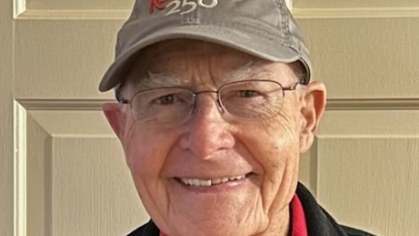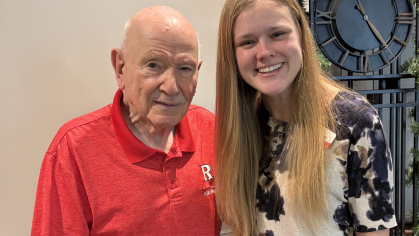Susan E. Van Vleet ’76 has spent nearly five decades working as a management consultant usingher social work background to guide companies and their staff in making changes big and small. She shares her journey to a career in social work and how her company, Susan Van Vleet Consultants, Inc., is ushering in change for the change makers.
Rutgers School of Social Work: Tell us about your educational and career journey.
Susan Van Vleet: I attended a program in high school called Future Jewish Center Workers. It was run by social workers from the Jewish Welfare Board in New York City. We attended weekend sessions on Sundays and learned about becoming a social worker in a Jewish non-profit. There were incredible social workers who trained us each week, including Saul Alinsky, the famous civil rights community organizer, and William Schwartz, who taught us about group work.
I was hooked! I finished high school and went to college convinced I needed to take every social science class available. I majored in sociology and minored in anthropology and psychology to prepare for an MSW. I also took one undergraduate social work course from another institution because my school didn’t offer them.
In 1968 I graduated and was hired by the Bureau of Children’s Services, which later became the Division of Youth & Family Services (DYFS) in New Jersey. Because of my work experience and education, I was put into intake immediately, investigating child abuse and neglect in Mercer County right out of college. I took every training opportunity DYFS offered, and because of Title 20, there were a lot.
As part of my work experience I took over the foster care function and developed a parenting pre-service training program for foster parents and adoptive parents. It was published in the Child Welfare League of America report. We got the program into every county in New Jersey, and we had 42 social workers implementing the program with the parents in their caseloads. During this time, the U.S. Foster Parent Association was being formed, and I supported that process along with the formation of a New Jersey branch. I was also part of a special program at my agency funded by Title 20 that put thirty of us through the MSW program at Rutgers. We all graduated with commitments to years of work and with enhanced titles.
After I completed my years at DYFS, I left to join Effectiveness Training Inc., a small for-profit educational corporation run by Dr. Thomas Gordon (the author of PET and a psychologist). I became his director of government relations and built that department in his company. We funded training programs in schools and public agencies all over the U.S. and in other countries. Our biggest contract involved training all the teachers and staff in the Queens, New York City school district.
Somewhere during all of this work I got married, divorced, and then married again – and I had two children! Looking back, I don’t know how I had the energy to do it all.
RUSSSW: What does your company, Susan Van Vleet Consultants, Inc., do?
SVV: We are a 43-year-old management consulting company. We specialize in diversity, change management, team building, communications, and any human issue in companies. Our clients are mostly Fortune 500 companies. We work with anyone from front-line workers to VPs and CEOs. We have over 25 copyrights and three trademarks. We have worked in 19 countries with people who come from all over the world.
What we do works because we use and teach the skills and concepts from social science. We have developed longstanding relationships with people we have coached and worked with to solve personal and professional problems. When people leave a company, they take us with them to their next company. Even though the company is our client, our belief is each individual we train or work with is also our client no matter where they work. We also have four distributors that we have trained and licensed to lead, market, and sell our programs. One of our distributors has worked with NASA and another works with CFOs.
RUSSW: How does your social work education relate to the work you do?
SVV: It relates directly to all the work we do. The concept of starting where the client is is something I learned from my first social work supervisor. I also continue to use my community organization skills and group work skills that I learned at Rutgers School of Social Work.
We have been able to solve problems with our clients that other consultants cannot because they do not have this skill base. We are not afraid of conflict or listening to people’s emotions because of our training, so we can make deeper and longer lasting change for our clients and their companies.
RUSSW: What are some of the ways your company is creating change for those who are change makers, like social workers?
SVV: We are opening up the corporate setting to the unique skill base social workers have. From assisting teams in coming together quickly and working through conflict so they can bring a lifesaving drug to market ahead of schedule to creating diversity and inclusion in places it did not exist, there are many opportunities for social workers to get involved.
For some of the VPs and CEOs with whom we work, we may be the first social worker or psychologist they have ever met. It may also be the first time they have experienced training based on social work or psychological principles. We also encourage people to participate in therapy. We make referrals out of every workshop we hold, mostly to LCSWs in our client’s area.
Another area I’m passionate about is advocating for fair pay for social workers. We are at a pivotal point in the field. We are needed everywhere, so it’s our time to leverage our requests for higher salaries. I always make it a point to share this idea with the groups of social workers. Most recently I discussed it with members of NASW California. I’ve also worked with a few social workers individually to ask for higher salaries. I think this is one of the most important things NASW should be doing. We need to examine what our salaries should be — not what they currently are.
RUSSW: As a change maker yourself, what are some of the challenges you face in creating change?
SVV: Personally, I am constantly reminding myself to have patience and that lasting change takes time; I cannot make it happen on my timeline. I am also cognizant of the need to “on board” everyone to a project so everyone in the organization has a stake in it. Those are always my biggest challenges. Some other management consultants would say it is the conflict that is their biggest challenge. For me, having been trained as a social worker, conflict is part of the process of change.
RUSSW: What are your hopes for the future of social work?
SVV: That my profession, which I love so much, will see itself as necessary everywhere. We social workers should feel confident that our unique skill base is needed all over the world in every setting. I also hope that we demand the salaries we deserve for the life changing work we do.
Since I’ve modeled what a social worker can be, there are currently more than ten children of our corporate clients who have chosen to get their social work degrees. They’re doing it because they see the changes in their parents. So, now, I am paying back by helping attract the next generation to the field of social work.



